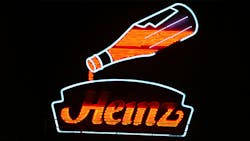Kraft Heinz Co. made a $143 billion offer for Unilever in what would be the largest takeover in the food or beverage industry, opening a campaign to create a consumer-goods giant with household names from Dove soap to Heinz ketchup.
Unilever said Friday, however, that it rejected the $50 per share proposal, comprising about two-thirds in cash and a third in new stock. The approach “fundamentally undervalues” the company, Unilever said, adding that it doesn’t see a basis for further discussions. Kraft Heinz said earlier it would seek to gain an agreement on the terms of a transaction.
Unilever shares surged as much as 15%t to a record in London, valuing the maker of Hellmann’s mayonnaise at more than 113 billion pounds ($140.38 billion). The Anglo-Dutch company’s stock gained as much as 12% in Amsterdam, while Kraft Heinz rallied more than 7% in New York.
The bid underscores consolidation among consumer-goods companies searching for profit-growth strategies as conditions become tougher across the globe. Kraft Heinz itself was forged in a $55 billion combination orchestrated by Warren Buffett’s Berkshire Hathaway Inc. and Brazilian investment firm 3G Capital, which had teamed up two years earlier on a buyout of H.J. Heinz.
There had been speculation that 3G would look to buy another food company and resume a cost-cutting cycle spearheaded by CEO Bernardo Hees. Mondelez International Inc., General Mills Inc. and Kellogg Co. had been mentioned as potential targets.
“Kraft Heinz’s approach demonstrates the pressure on brand owners to consolidate in the face of international pressure on margins and constraints to organic growth opportunities,” said Paul Hickman, an analyst at Edison Investment Research. “Kraft Heinz will not have led with its best offer and a protracted negotiation probably lies ahead.”
Unilever said the proposal was at an 18% premium to Thursday’s closing share price. Berenberg analysts said such a valuation would imply multiples of three times sales and 21 times earnings, “which strikes us as very low.”
Putting together Kraft Heinz and Unilever would create a company with combined sales of $84.8 billion last year. That would have ranked second among food and beverage companies, trailing Nestle SA’s $91.2 billion, according to data compiled by Bloomberg.
Among food and beverage transactions, a deal for Unilever would surpass Anheuser-Busch InBev SA’s purchase last year of SABMiller Plc for about $123 billion including debt, InBev’s purchase of Anheuser-Busch Cos. in 2008 and the 2015 transaction that created Kraft Heinz, according to data compiled by Bloomberg.
The investors behind the Unilever bid were on all those deals as well. 3G Capital — founded by Brazilian executives Jorge Paulo Lemann, Marcel Telles, Carlos Alberto Sicupira, Roberto Thompson and Alex Behring — has engineered a series of huge transactions in the food-and-drink industries in which they acquire companies, install managers and slash expenses. 3G also acquired Burger King Worldwide Inc. and in 2014 merged it with Canadian doughnut chain Tim Hortons Inc.
Kraft’s overture follows the worst annual performance of Unilever’s stock last year since the financial crisis in 2008. The shares fell 2.5% in the course of 2016, though European rival Nestle SA fared only marginally better, losing 2% in the same 12 months.
By Thomas Buckley and Ruth David, with assistance from Phil Serafino.
About the Author
Bloomberg
Licensed content from Bloomberg, copyright 2016.
